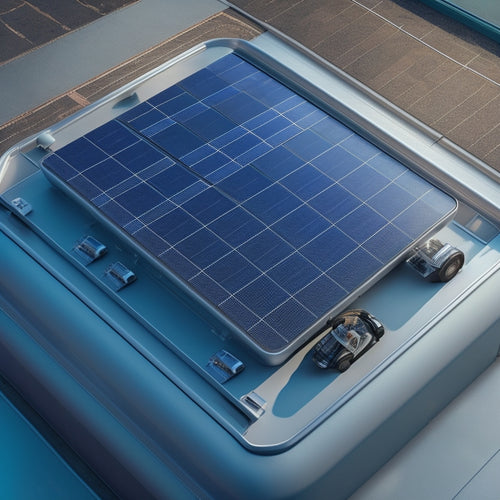
What Are My Vehicle Solar Panel Options?
Share
You have multiple vehicle solar panel options to choose from, including flexible, rigid, foldable, and solar blanket designs that cater to different energy needs, vehicle types, and lifestyles. Popular brands like Goal Zero, Renogy, and WindyNation offer a range of products. If you need a tailored solution, custom designs can optimize performance for your specific vehicle requirements. As you explore your options, you'll want to take into account factors like installation costs, material types, and warranty options to make sure a reliable and efficient system. Discover which option suits you best, and take the next step towards a cleaner, more sustainable drive.
Key Takeaways
• You can choose from flexible, rigid, foldable, or solar blanket panels depending on your vehicle's surface and energy needs.
• Leading brands like Goal Zero, Renogy, WindyNation, and HQST offer a range of vehicle solar panel solutions.
• Custom solutions can be tailored to your specific energy requirements and vehicle type for optimal performance.
• The cost of vehicle solar panels varies based on material quality, type, and labor complexity, so it's essential to research and compare options.
• Different material types, including monocrystalline, polycrystalline, and thin-film panels, offer varying levels of efficiency and durability.
Types of Vehicle Solar Panels
When it comes to harnessing the sun's energy on the move, you'll find several types of vehicle solar panels catering to different needs and applications. Each boasts unique characteristics, advantages, and limitations.
For instance, flexible solar panels are perfect for curved surfaces, such as RV roofs, offering high Solar Panel Efficiency and portability.
Rigid solar panels, on the other hand, provide higher power output and are ideal for flat surfaces like truck beds.
If you're looking for a convenient option, foldable solar panels are a great choice, allowing for easy Portable Charging on-the-go.
You can also opt for solar blankets, which are ultra-portable and lightweight, making them perfect for camping trips or backpacking adventures.
Lastly, there are solar generators, which combine solar panels with battery storage for a reliable and self-sustaining power system.
Vehicle Solar Panel Brands Available
As you explore vehicle solar panel options, you'll come across various brands that specialize in renewable energy solutions.
You'll notice that industry leaders like Renewable Energy Leaders offer high-quality solar panels designed specifically for vehicles.
Now, let's take a closer look at the top solar panel brands that are making a mark in the industry.
Renewable Energy Leaders
Explore the following renowned brands that spearhead the development of high-efficiency vehicle solar panels, designed to harness the sun's energy for your on-the-go power needs. As an environmentally conscious individual, you're likely drawn to Energy Pioneers and Sustainability Champions who prioritize eco-friendliness and innovation.
| Brand | Specialization | Notable Feature |
|---|---|---|
| Goal Zero | Portable solar panels | High-efficiency cells for maximum energy output |
| Renogy | Monocrystalline solar panels | Durable and waterproof designs for off-grid adventures |
| WindyNation | Solar charging systems | Advanced maximum power point tracking (MPPT) technology |
These Renewable Energy Leaders have established themselves as authorities in the industry, offering excellent products that cater to your unique energy requirements. By choosing a reputable brand, you're not only investing in a reliable power source but also supporting companies that share your commitment to sustainability.
Top Solar Panel Brands
With a plethora of options available, you can choose from the following top solar panel brands that cater specifically to vehicle solar panel needs, offering a range of efficient and durable solutions.
When it comes to solar panel innovations, brand reputation matters. You want a brand that has a proven track record of delivering high-quality products that can withstand the demands of life on the road.
Here are some top solar panel brands to take into account:
-
Renogy: Known for their high-efficiency solar panels and versatile mounting systems, Renogy is a popular choice among vehicle owners.
-
HQST: HQST offers a range of solar panels designed specifically for vehicles, with a focus on durability and ease of installation.
-
Windynation: With a focus on innovation and quality, Windynation offers a range of solar panels and accessories designed to meet the unique needs of vehicle owners.
These brands have established themselves as leaders in the industry, offering reliable and efficient solar panel solutions for your vehicle. By opting for a reputable brand, you can be confident that your solar panel system will provide you with years of reliable service.
Custom Vehicle Solar Panel Solutions
You can benefit from custom vehicle solar panel solutions that cater to your specific energy needs and vehicle requirements. These tailored solutions guarantee you get the most out of your solar panel system, providing you with the energy freedom you desire.
Whether you need a solar roof or a custom-designed solar panel array, a reputable supplier can work with you to create a system that meets your unique needs.
Vehicle Solar Panel Installation Costs
When calculating the total cost of installing solar panels on your vehicle, you'll need to take into account three key factors:
- The cost of the solar panel material itself
- The labor costs of hiring a professional to install the system
- The cost of additional equipment and wiring required to integrate the panels with your vehicle's electrical system.
These components can vary greatly in price depending on the specific requirements of your installation. By understanding the breakdown of these costs, you can better plan and budget for your vehicle's solar panel installation.
Solar Panel Material Costs
Solar panel material costs, which account for about half of the total vehicle solar panel installation costs, vary greatly depending on the type and quality of materials chosen. As you explore your options, you'll want to evaluate the trade-offs between cost, efficiency, and durability.
When it comes to material sourcing, you have several options to ponder:
-
Monocrystalline silicon panels: These high-efficiency panels are more expensive, but they offer superior performance and durability.
-
Polycrystalline silicon panels: A more affordable option, these panels still offer good performance, but at a lower cost.
-
Thin-film panels: The most budget-friendly option, these panels are less efficient, but still a viable choice for smaller systems.
To optimize costs, contemplate the following strategies: prioritize high-efficiency panels for smaller systems, and balance panel quality with system size to achieve your energy goals.
Installation Labor Costs
It's important to take into account that labor costs, which can make up to 30% of your total vehicle solar panel installation expenses, are largely influenced by the complexity of the installation and the installer's level of expertise.
As you plan your solar panel installation, it's vital to factor in the labor costs involved. The more complex the installation, the higher the labor costs. For example, if you have a camper van with a curved roof, the installation may require more time and effort, resulting in higher labor costs.
Additionally, labor laws and regulations in your area may also impact the labor costs. For instance, some states may have specific requirements for solar panel installations, which can increase the labor costs.
Moreover, workforce shortages in the solar industry can also drive up labor costs. If there's a high demand for solar installers in your area, you may end up paying a premium for their services. It's important to research and compare prices from different installers to get the best deal.
Equipment and Wiring Costs
You'll need to budget for the cost of the solar panels themselves, which can range from $100 to $500 or more per panel, depending on the quality, efficiency, and brand. Additionally, you'll need to take into account the cost of the necessary equipment and wiring to connect the solar panels to your vehicle's electrical system.
Here are some key components to factor into your budget:
-
Charge Controller: This device regulates the flow of energy from the solar panels to your battery, ensuring safe and efficient charging. ($50-$200)
-
Mounting Hardware: You'll need a sturdy mounting system to secure the solar panels to your vehicle's roof or hood. ($20-$100)
-
Wiring and Connectors: High-quality wiring and connectors are essential for a reliable and efficient off-grid system. ($20-$50)
When designing your off-grid system, it's important to take into account circuit design and the overall electrical architecture of your vehicle. A well-designed system will help achieve efficient energy harvesting and effective battery charging. By factoring in these equipment and wiring costs, you'll be well on your way to a reliable and efficient solar-powered vehicle.
Benefits of Vehicle Solar Panels
Installing vehicle solar panels can greatly reduce your reliance on traditional fuel sources, leading to a cleaner and more sustainable driving experience. By harnessing the power of the sun, you'll not only reduce your carbon footprint but also enjoy the freedom of eco-friendly driving.
With solar panels, you can recharge your vehicle's batteries while on the go, giving you roadside freedom to explore without worrying about running out of juice.
One of the most significant benefits of vehicle solar panels is the reduction of greenhouse gas emissions. By switching to a renewable energy source, you'll be doing your part to minimize your impact on the environment. Plus, with lower emissions, you'll also reduce air pollution, making the air cleaner and healthier for everyone.
Additionally, solar panels can increase your vehicle's range, allowing you to travel farther without needing to stop and recharge. This means you can take longer road trips, explore new destinations, and enjoy the freedom of the open road without worrying about running out of power.
Vehicle Solar Panel Maintenance Tips
Regularly inspecting and cleaning your vehicle's solar panels guarantees maximum energy harvesting and prolongs their lifespan. A well-maintained solar panel system ensures peak Panel Efficiency, which directly impacts your vehicle's overall performance. Neglecting maintenance can lead to reduced energy output, decreased Battery Health, and even premature system failure.
To keep your solar panels in top condition, follow these essential maintenance tips:
-
Clean your panels regularly: Dirt, dust, and debris can greatly decrease energy output. Use a soft-bristled brush and mild soap solution to wipe away impurities.
-
Inspect for damage or wear: Check for loose connections, cracks, or signs of physical damage that could compromise your system's integrity.
-
Monitor your system's performance: Keep an eye on your system's energy output and battery health to identify potential issues before they become major problems.
Vehicle Solar Panel Warranty Options
Your solar panel system is a significant investment, and safeguarding it with a thorough warranty can provide peace of mind and financial security in case anything goes wrong. When it comes to vehicle solar panel warranty options, you have several choices to guarantee your system is well-protected.
Most manufacturers offer a standard warranty that covers defects and repairs for a certain period, typically ranging from 2 to 25 years. However, you may want to think about extending your warranty for added Panel Protection. Warranty Extensions can provide additional years of coverage, giving you long-term security and minimizing out-of-pocket expenses.
Some manufacturers also offer premium warranties that include extra benefits, such as 24/7 technical support and priority repair services. When evaluating warranty options, take into account factors like coverage duration, claim process, and customer support.
Frequently Asked Questions
Can I Use Vehicle Solar Panels in Cloudy or Shaded Areas?
You'll find that vehicle solar panels still work in cloudy or shaded areas, albeit with reduced efficiency. Expect a 10-20% drop in Cloudy Performance and a 30-40% decrease in Shaded Efficiency, but they'll still generate some power.
How Do I Clean and Protect My Vehicle Solar Panels?
To keep your vehicle solar panels running efficiently, you'll need to prioritize panel maintenance. Regularly clean your panels with a soft cloth and mild soap, then apply a dust repellent coating to reduce debris accumulation and guarantee peak energy harvesting.
Are Vehicle Solar Panels Compatible With My Vehicle's Electrical System?
As you venture into the world of solar-powered vehicles, you're wise to wonder: are your vehicle's electrical systems prepared to harmonize with solar panels? You'll need electrical upgrades and seamless system integration to guarantee a symphony of sustainability.
Can I Charge My Vehicle's Battery While Driving With Solar Panels?
While driving, you can charge your vehicle's battery with solar panels, but it's important to take into account solar efficiency and battery health; make sure your system is optimized to avoid overcharging, which can negatively impact battery lifespan.
Do Vehicle Solar Panels Void My Vehicle's Warranty?
As you navigate the uncharted territory of vehicle solar panels, a beacon of caution emerges: before installation, conduct a Warranty Check to verify compliance with Manufacturer Policies, lest you unwittingly void your vehicle's sacred warranty.
Related Posts
-

Solar Panel System Certification Costs: A 10-Point Breakdown
You're looking to understand the costs associated with solar panel system certification. Your total certification cos...
-

Top Solar Panels for Car Battery Maintenance
When selecting top solar panels for car battery maintenance, consider high-efficiency models with high wattage output...
-

Why Cities Need Smart Charging Infrastructure Now
You're about to experience a tidal wave of electric vehicles hitting your city's streets, and it's essential you're p...


